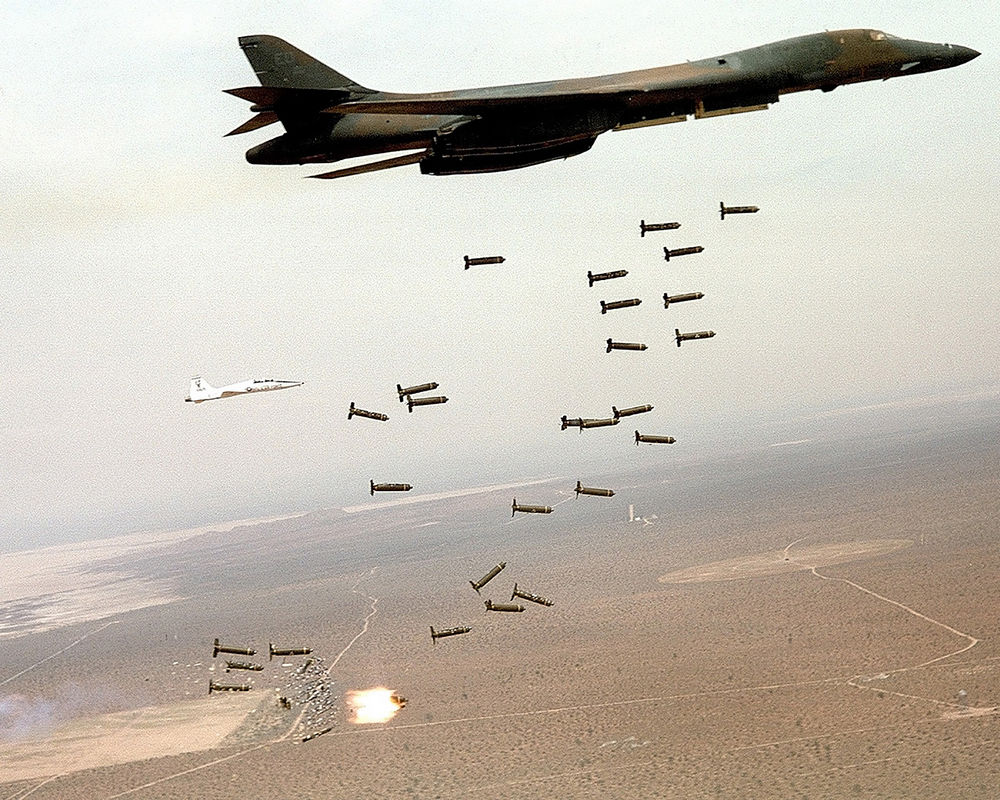The Hague Conventions of 1899 and 1907 codified international humanitarian law applicable in wartime, including protection of civilians and prisoners of war and prohibition of weapons systems that were inhumane. At that time, this included poisonous gases and expanding bullets. In 1980, the Convention on Prohibitions or Restrictions on the Use of Certain Conventional Weapons Which May Be Deemed to Be Excessively Injurious or to Have Indiscriminate Effects (CCW) was adopted. It affirmed ‘the principle of international law that the right of the parties to an armed conflict to choose methods or means of warfare is not unlimited, and on the principle that prohibits the employment in armed conflicts of weapons, projectiles and material and methods of warfare of a nature to cause superfluous injury or unnecessary suffering.’
Subsequent protocols to the CCW have provided restrictions or comprehensive prohibitions on specific weapons systems, the use of which would cause superfluous injury or cause unnecessary suffering. In some case, e.g. landmines and cluster munitions, comprehensive prohibitions were not possible to achieve through the CCW due to opposition by a few stand-out States Parties, and so like-minded groups of countries negotiated separate, stand-alone treaties.
Relevant international agreements:
- Hague Conventions of 1899 and 1907
- Convention on Certain Conventional Weapons (Inhumane Weapons Convention) 1980, and the additional protocols:
- Protocol I on Non-Detectable Fragments
- Protocol II on Prohibitions or Restrictions on the Use of Mines, Booby Traps and Other Devices
- Protocol III on Prohibitions or Restrictions on the Use of Incendiary Weapons
- Protocol IV on Blinding Laser Weapons
- Protocol V on Explosive Remnants of War
- Anti-Personnel Mine Ban Convention (Mine Ban Treaty), 1997
- Convention on Cluster Munitions, 2008
Recommendations:
Parliamentarians and parliaments can:
- Ensure the ratification of the landmines and cluster munitions conventions by their parliament/government;
- Ensure that implementation measures for the landmines and cluster munitions conventions include prohibition of investments in the cluster munitions and landmines industries;
- Support the adoption of an international commitment (declaration or agreement) on preventing the use of explosive weapons with wide area effects in populated areas.
Examples of good parliamentary practice:
CLUSTER MUNITIONS
France – Law on the Elimination of Cluster Munitions, 2010
France is a former user, producer, and exporter of cluster munitions. However, France joined the negotiations for the Cluster Munitions Convention, signed the treaty in 2008 and ratified it in 2009. It enacted national implementation legislation, the Law on the Elimination of Cluster Munitions, on July 20, 2010. The law has facilitated the successful destruction of France’s stockpile of 34,876 cluster munitions and 14.9 million submunitions. This was achieved on June 30, 2016, more than two years in advance of its deadline.
Netherlands regulations on divestment from the cluster munitions industry
Following the adoption of the Cluster Munitions Convention in 2008, a number of countries ratifying the convention adopted regulations prohibiting investments in the cluster munitions industry as part of legislation or policy to implement the treaty. The initial legislation adopted by Netherlands in 2011 to implement the treaty did not include a prohibition on cluster munitions investments. However, such a prohibition was adopted as part of the Market Abuse (Financial Supervision Act) Decree Amendment, 2013. The Netherlands policy includes financial penalties on institutions that violate the law, and vests authority for monitoring and enforcement of the policy with the Netherlands Authority for Financial Markets (AFM). The AFM provides a regularly updated list of cluster munitions producers.

Belgium – Laws banning inhumane weapons and related investments
Through the Law on Anti-personnel Mines, 1995 and the Law Regulating Economic and Individual Activities with Weapons, 2006, Belgium became the first country in the world to, respectively, adopt national legislation banning landmines and cluster munitions. Belgium’s unprecedented legislative initiatives preceded the international treaties banning landmines and cluster munitions (Mine Ban Treaty and Cluster Munitions Convention), and inspired, strengthened and shaped the international approach. In addition, Belgium was the first country in the world to prohibit investments in producers of cluster munitions, when in 2007 its parliament unanimously adopted the ‘Mahoux Law’ (named after the law’s sponsor Senator Philippe Mahoux). The law expanded an existing regulation banning investments in landmine manufacturers. The Belgian parliament also adopted legislation in 2007 banning weapons using depleted uranium, and followed up on this two years later by adopting a law, also sponsored by Senator Mahoux, prohibiting investments in depleted uranium weapons.
European Parliament, 2007
In October 2007, the European Parliament indicated its support for banning cluster munitions and investments in the cluster munitions industry, by adopting a resolution entitled International Treaty to ban cluster munitions, in which the Parliament called for a moratorium on using, investing in, stockpiling, producing, transferring, or exporting cluster munitions, and supports negotiations for a Cluster Munitions Treaty. The EP resolution cited the ‘Mahoux Law’ as inspiration and precedent.
US Cluster Munitions Civilian Protection Act, 2017
The Cluster Munitions Civilian Protection Act, 2017, introduced by Senators Diane Feinstein and Patrick Leahy, continues a series of US congressional actions since the Cluster Munitions Convention was concluded in 2008. The United States has not signed the Convention. However, previous congressional action in support has been effective in influencing US policy, including the adoption of a policy in 2008 to phase out the production and use of cluster munitions that result in more than a 1% UXO (Unexploded Ordnance) rate by 2018.
In 2017, the Trump administration abandoned this policy, allowing for more liberal use of cluster munitions by US Defence forces. The Cluster Munitions Civilian Protection Act 2017 supports the previous restrictions on cluster munitions, as well as additional restrictions on production and sales of cluster munitions and against any use of cluster munitions in civilian areas. If adopted, it would prohibit congressional funding for such activities. The Act also calls on the US to sign and ratify the Cluster Munitions Convention. To date, the act has not received sufficient support for its adoption.

These indiscriminate weapons have left a legacy of unexploded munitions in war-torn areas. While the United States has not widely used cluster munitions since the 2003 invasion of Iraq, U.S.-made cluster bombs have recently been used in Yemen, endangering civilians. The United States should join the more than 100 nations that have agreed to never again use or export these weapons by signing the Convention on Cluster Munitions. This legislation would encourage the administration to do exactly that.
Senator Diane Feinstein.
LANDMINES
Bosnia and Herzegovina Demining Law 2002 (amended 2017)
Bosnia and Herzegovina ratified the Mine Ban Treaty in 1998 and adopted the Demining Law in 2002 to implement the treaty. Landmines had been used in the territory during the Bosnian war of 1992-1995, resulting in over 3000 casualties. At the end of the war hundreds of thousands of unexploded mines remained. The 2002 law established a Bosnia and Herzegovina Mine Action Centre to coordinate demining and victim assistance, and a Demining Commission to oversee and review implementation.
Since its establishment, the authorities have facilitated the discovery and safe destruction of over 45,000 anti-personnel mines, over 7,000 anti-tank mines and approximately 40,000 explosive remnants of war. Parliament continues to play an oversight role in reviewing the implementation of the law and approving the National Mine Action Strategy. For more information see Landmine and Cluster Munition Monitor Country Reports: Bosnia and Herzegovina.
Ireland Cluster Munitions And Anti-Personnel Mines Act (2008)
Ireland ratified the Mine Ban Treaty in 1999 and adopted implementing legislation the same year. The legislation was updated in 2008 to also enact Ireland’s obligations under the Cluster Munitions Convention. The legislation was amended again in 2020 to add additional provisions, most notably a prohibition of investments in the landmines and cluster munitions industries.
Joint US Congressional letter on Landmines, May 2020
The United States has not joined the Mine Ban Treaty. However, in 2014 the Obama Administration announced a new policy that would limit production and deployment of landmines to US military operations in the Korean peninsula, i.e. to defend the Republic of Korea (ROK) against an attack from the Democratic Peoples’ Republic of Korea. The Administration also gave a commitment to explore alternative means to ensure the security of the ROK in order to be able to accede to the Mine Ban Treaty. In January 2020, the Trump administration reversed this policy with a new policy directive allowing military commanders to deploy landmines in other military operations. In response, Senator Patrick Leahy and Member of the House of Representatives Jim McGovern sent the Secretary of Defense a joint letter endorsed by 100 other congressional members opposing the change of policy and raising a series of questions regarding any military use of landmines and advancing options for the feasibility of alternatives to such use.
EXPLOSIVE WEAPONS IN POPULATED AREAS
International Parliamentary Appeal
In March 2019, the International Network on Explosive Weapons released an International Parliamentary Appeal to prevent human suffering from the use of explosive weapons in populated areas. The appeal calls upon governments to ‘urgently develop, adopt and implement an international commitment to address this clear and documented pattern of harm by stopping the use of explosive weapons with wide area effects in populated areas and assisting affected people and communities.’
INFO BOX 3:
Risks associated with poorly maintained stockpiles of ammunition, chemicals and pathogens
The blast at a port warehouse in the Lebanese capital, Beirut, on August 4, 2020, put into clear focus the dangers associated with storage of explosive materials or chemical substances. The detonation of 2,750 tons of ammonium nitrate killed some 150 people, wounded thousands and caused destruction across half the city. The explosion was estimated to be equivalent to 1,000 to 1,500 tonnes of TNT, which is about a tenth of the intensity of the Hiroshima nuclear bomb, but far bigger than any blast from a conventional weapon (Incidentally, the blast occurred just two days before the 75th commemoration of the nuclear weapon attack on Hiroshima.) Although the explosion was deemed an accident (the result of mismanagement, incompetence and complacency in the storage of the depot), rather than a deliberate attack, and the chemical that was stored was not intended for bomb manufacturing, it has raised concerns over the potential catastrophic consequences to people, infrastructure, economic livelihoods and to the environment, of poorly maintained stockpiles of potentially explosive materials.
Used for fertiliser, explosive devices in the construction and mining industries, and as an ingredient in bombs, ammonium nitrate is a salt made from ammonium and nitric acid, and it is highly explosive. The Beirut explosion wasn’t the first time an accident involving ammonium nitrate caused catastrophic consequences. In 1947, about 2,300 tonnes of the chemical exploded in the port of Texas City as a result of a carelessly flicked cigarette. That detonation caused a chain reaction when a nearby ship, which also carried ammonium nitrate, exploded, setting fires at chemical tanks and oil refineries near the port. The disaster killed an estimated 581 people and injured roughly 3,500 people. It is considered the deadliest industrial accident in US history. Over thirty accidental explosions with ammonium nitrate have occurred in the last 100 years. Next to these accidents, the fertiliser has also been used in numerous terrorist attacks over the years, including the 1995 terrorist bombing in Oklahoma City, US, the 2002 nightclub bombing in Bali, Indonesia, and the bombing by Anders Breivik in Oslo, Norway. Due to its potential use in bomb-making, many countries have strict regulations in place on the storage, maintenance and use of the compound. For example, many European Union nations require ammonium nitrate to be mixed with calcium carbonate to make a safer compound.
The United Nations Secretary-General’s Disarmament Agenda also recognises the importance of securing excessive and poorly maintained stockpiles. Action Point 22 sets out four priorities in addressing weapons and ammunition management. While the action point focuses on ammunition in a military context, it opens the door for action on other materials that could be harmful.
Resources:
- Ratification kit and model legislation for the Cluster Munitions Convention, produced by the International Committee of the Red Cross. Available in Arabic, Chinese, English, French and Spanish.
- Country and international organisation statements on the use of explosive weapons in populated areas, compiled by the International Network on Explosive Weapons
- Key Questions and Answers on a Political Declaration on the Use of Explosive Weapons in Populated Areas, Human Rights Watch, June 2020
- Compilation of existing guidelines, best practices and other recommendations aiming at addressing the diversion or illicit use of materials which can be used for Improvised Explosive Devices (IEDs), compiled by the UN Expert Group on the Convention on Certain Conventional Weapons Protocol II
- NATO Guidelines for the storage of military ammunition and explosives, NATO, 2015
- OSCE Handbook of Best Practices on Conventional Ammunition, 2008
- Counter-IED Capability Maturity Model and Self-Assessment Tool, Bob Seddon and Alfredo Malaret, UNIDIR, June 2020






